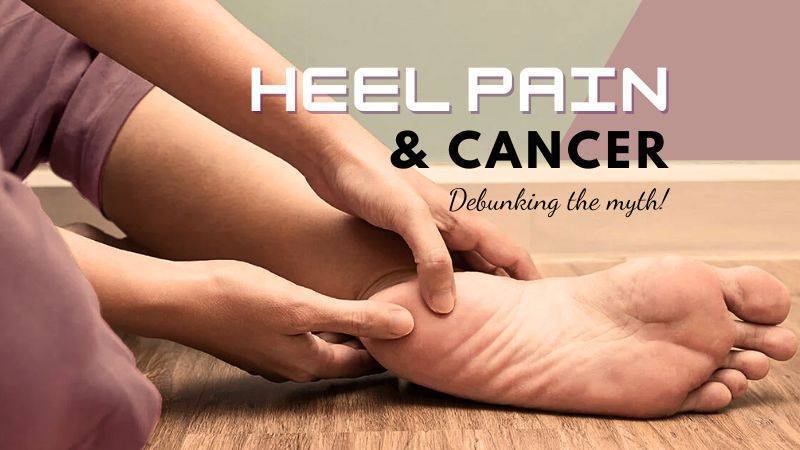Overview
Heel pain is a common complaint experienced by many individuals, often causing discomfort and limiting mobility.
Upon receiving a cancer diagnosis, concerns related to heel pain and plantar fasciitis might not be at the forefront of your thoughts.
Nevertheless, being aware of the potential connections between cancer and heel pain and how to manage heel pain during this challenging period can help alleviate an additional burden and source of discomfort.
In this article, we will delve into how cancer treatments can contribute to plantar fasciitis, explore specific considerations for addressing heel pain while undergoing cancer treatment, and assess whether heel pain can indicate cancer.
Understanding Heel Pain: Causes and Risk Factors
Heel pain can result from various factors, including mechanical issues, inflammation, injury, or even systemic conditions.
Some of the most common causes of heel pain include:
Plantar Fasciitis

This is the most common cause of heel pain, resulting from inflammation of the plantar fascia, the band of tissue that connects the heel bone to the toes.
It can occur due to
- Excessive physical activity
- Improper footwear
- being overweight
Achilles Tendinitis
This condition involves inflammation of the Achilles tendon, which connects the calf muscles to the heel bone.
It can result from overuse, inadequate footwear, or tight calf muscles.
Heel Spurs

These are bony growths that develop on the underside of the heel bone, often due to repetitive stress on the heel or biomechanical abnormalities.
Bursitis
Inflammation of the bursa, a fluid-filled sac that cushions the heel, can lead to heel pain.
It can be caused by injury, overuse, or underlying inflammatory conditions.
Stress Fractures

Small cracks in the heel bone can cause pain, often due to repetitive force or impact on the heel.
Heel Pain and Cancer: Dispelling the Myth
Although heel pain can be a symptom of an underlying condition, it is essential to note that cancer is rarely the cause.
The idea that heel pain could be a sign of cancer likely stems from the fact that some cancers can metastasize to the bone, causing pain in various parts of the body.
However, this is not a common occurrence, and it is even less likely for cancer to be the primary cause of heel pain.
Furthermore, cancers that may metastasize to the bone typically originate in the
In these cases, patients will typically experience other symptoms related to the primary cancer site before noticing any bone pain.
When Is Heel Pain an Indicator of Cancer?

If you are experiencing persistent or severe heel pain, it is essential to consult a healthcare professional for a proper evaluation and diagnosis.
While cancer is not a likely cause, other underlying conditions could be contributing to the pain and should be addressed.
Discovering unusual lumps or hard bumps on the feet or heels doesn’t necessarily warrant an immediate assumption of cancer.
Most bumps and lumps are benign, often resulting from shoes rubbing or irritating foot tissues.
Nevertheless, if you experience symptoms like
- fatigue
- swollen lymph nodes
- fever
- unexplained weight loss
along with your heel pain or foot lump, it’s important to schedule an appointment with your doctor.
Additionally, consult a doctor if your heel pain or bumps on the heel or foot do not respond to conservative treatments or appear to be growing.
Your healthcare provider will likely take a detailed medical history, perform a physical examination, and may order imaging tests such as X-rays, MRI, or ultrasound to determine the cause of your heel pain.
Based on the findings, your healthcare provider will recommend appropriate treatment options.
Treating and Preventing Heel Pain Alongside Cancer
Remarkably, 90% of plantar fasciitis cases can be resolved without surgery using various treatment methods, such as:
Orthotics

Specialized orthotic inserts designed specifically for plantar fasciitis, rather than generic foam inserts found in stores, are an excellent way to alleviate heel pain symptoms while addressing the core issue – a damaged and unsupported arch.
These inserts, known as Heel Seats, offer targeted
- Acupressure relief
- Optimal arch elevation
- Durable (and washable) cushioning
- The essential arch support—all at an affordable cost
Stretching

Gentle stretches targeting the heel, ankles, toes, and calves can significantly improve the arch’s elasticity and weight-bearing capacity.
Many of these stretches can be performed from the comfort of your bed, requiring just a few minutes a day.
Stretching also promotes better blood circulation and releases endorphins, which can be especially beneficial during rigorous cancer treatment schedules.
Night Splints or Socks

When undergoing exhausting cancer treatments, even stretching in bed may seem too demanding.
Utilizing a night splint (or a sock night splint for added comfort and softness) can maintain your foot in a gentle stretch throughout the night, considerably easing plantar fasciitis pain—particularly during the first few steps upon waking.
Icing and Self-Massage
Simple pain-relief techniques like icing and self-massage (using either your fingers or various household items) can significantly alleviate heel pain.
Apply icing and massage as frequently as needed throughout the day, spending 10-20 minutes on the affected area.
Conclusion
Keep in mind that, in most instances, heel pain is an unfortunate side effect of certain cancer treatments rather than an indication of cancer itself. Regardless of the situation, knowledge is crucial for promoting healing and maintaining your overall health.
Also Read






